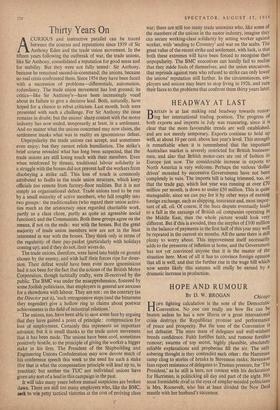A CURIOUS and instructive parallel can be traced between the courses
and reputations since 1939 of Sir Anthony Eden and the trade union movement. In the fifteen years following the outbreak of war, the trade unions, like Sir Anthony, consolidated a reputation for good sense and for stability. But they were not fully tested : Sir Anthony, because he remained second-in-command; the unions, because no real crisis confronted them. Since 1954 they have been faced with a succession of problems—differentials, automation, redundancy. The trade union movement has lost ground; its critics—like Sir Anthony's—have been increasingly vocal about its failure to give a decisive lead. Both, naturally, have hoped for a chance to rebut criticism. Last month, both were presented with such a challenge. For Sir Anthony the issue remains in doubt; but the unions' sharp contest with the motor industry has now ended, temporarily at least, in a settlement. And no matter what the unions concerned may now claim, the settlement masks what was in reality an ignominious defeat.
Unpopularity the trade unions can accept, and sometimes even enjoy; but they cannot relish humiliation. The strike's brief course revealed what has long been suspected, that the trade unions are still losing touch with their members. Even when reinforced by threats, traditional labour solidarity in a struggle with the bosses did not prevent half the workers from disobeying a strike call. This loss of touch is commonly attributed to faults in the trade union structure, which keep officials too remote from factory-floor realities. But it is not simply an organisational defect. Trade unions tend to be run by a small minority of active members, who fall roughly into two groups : the traditionalists (who regard their union activi- ties much as the aristocracy once regarded charitable work, partly as a class chore, partly as quite an agreeable social function); and the Communists. Both these groups agree on the means, if not on the ends: war with the bosses. But the great majority of trade union members now are not in the leaSt interested in war with the bosses. They think only in terms of the regularity of their pay-packet (particularly with holidays coming up); and if they do not, their wives do.
The trade unions, therefore, were lured into battle on ground chosen by the enemy, and with half their forces ripe for deser- tion. Their defeat would have been even more ignominious had it not been for the fact that the actions of the British Motor Corporation, though tactically crafty, were ill-received by the public. The BMC was under the misapprehension, fostered by some foolish politicians, that employers in general are anxious for a showdown with labour. They are not : on the contrary (as the Director put it), 'such retrogressive steps (and the bitterness they engender) give a hollow ring to claims about postwar achievements in the field of industrial relations.'
The unions, too, have been able to save some face by arguing that they have gained a point of principle : compensation for loss of employment. Certainly this represents an important advance; but it is small thanks to the trade union movement that it has been made. The unions have been cool, sometimes positively hostile, to the principle of giving the worker a bigger stake in his firm. The President of the Shipbuilding and Engineering Unions Confederation may now devote much of his conference speech this week to the need for such .a stake (for that is what the compensation principle will lead up to, in practice); but neither the TUC nor individual unions have given any sort of a lead in this campaign in the past. war; there are still too many trade unionists who, like some of the members of the unions in the motor industry, imagine they can secure working-class solidarity by setting worker against worker, with `sending to Coventry' and war on the scabs. The great value of the recent strike and settlement, with luck, is that both these extremes will have been forced to recognise their unpopularity. The BMC executives can hardly fail to realise that they made fools of themselves; and the union executives, that reprisals against men who refused to strike can only lower the unions' reputation still farther. In the circumstances, em- ployers and unions may learn to stop living in 1926, and turn their faces to the problems that confront them thirty years later.


































 Previous page
Previous page